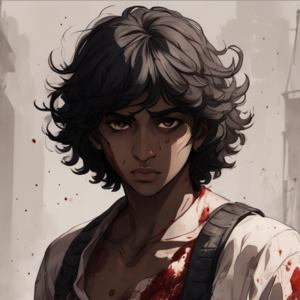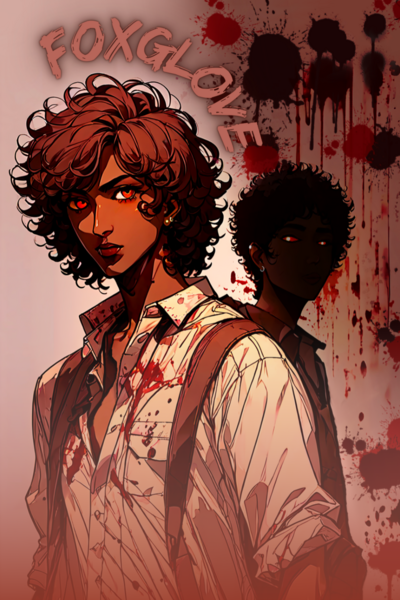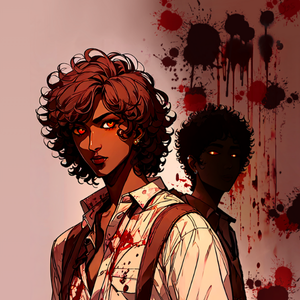Seven—Shunya counts the number of hostages in the grimy cell. Counting his time carefully, he takes two and three-quarters of a second to tuck his assault rifle under his arm to free one hand, allowing him to glance down at his pager to confirm the number.
Scanning the dim screen, Shunya glances back and forth between the wide, fearful eyes behind the jail bars, taking into account their tattered clothing and respective uniforms. With one hand, he taps out a message and sends it before shoving the pager into the front pocket of his thick cargo pants. All the hostages confirmed alive—two hired security personnel, three humanitarian aid workers, and two South Korean military officers.
He takes a step forward, settling both hands on his semi-auto as he speaks, once in Korean to the officers, once in English for good measure, nudging his head in the direction of the other prisoner, “Tell them to cover their ears and keep quiet. Don’t scream.”
With wide eyes, the officers nod.
Without much further warning, he fires twice, point-blank downward into the chain lock tying the rusty cell doors shut. A half-gasp echoes in the room as one of the officers claps a hand over a woman’s mouth. Shunya glances sharply at him as he pulls the broken chains loose and drops them on the ground.
The door swings open, and Shunya wastes no time in tossing the machine gun in his hand at the less muscular officer, deciding he looks more stable and clear-headed. He smiles when the officer catches it, reflexively tucking it into position. His palms are heavily calloused but his knuckles aren’t ruined and scarred, leading Shunya to infer the guy wasn’t as good with hand-to-hand as he was with his aim and trigger finger. Well, that and Shunya recalls his file saying something similar—the man is Song Jaeha, a Special Warfare Command third division squad leader.
The women huddled in the release a collective gasp when Shunya tosses the weapon over, one choking on a sob as tears stream down her cheeks, both hands covering her mouth as she looks pleadingly at him.
Shunya breaks off his train of thought there and closes his eyes, his hearing heightening as he exhales, the world coming to life in the dark—and, nothing. Nothing pressing, at least. He should shuffle the hostages over to the extraction site in good time, without running into any heavily-armed problems. Easier than expected—his terror cell is disorganized at best, and Shunya took care of the group of eleven of their members in front of the derelict prison.
Nonetheless, Shunya still unholsters a silencer from the rig clipped to the side of his side before using the backs of his gloved fingers to pat one of the pockets on his belt, double checking where the correct corresponding cartridges are. He debates passing the Beretta he still has holstered to one of the other men in the group, but decides against it.
“Let’s go,” Shunya turns to the hostages, who scramble to their feet, scared but mostly mobile. He’s about to turn around again and lead the way out when the clanking of metal echoes as the long gun is pointed at Shunya’s chest.
The wind whistles when it blows through the small, shattered window on the left wall. Shunya sighs deeply. One of the men speaks first in accented English.
“Who are you? And why are you doing this?”
Shunya blinks. “I have instructions to escort you and the remaining living hostages to a safe house in Maradhoo where you’ll be collected and taken home—as per what was requested from us by your superiors.”
Jaeha still looks wary, hesitating. “What’s the mission code, then? Tell me or you won’t take another step on this earth.”
“Gnoxia Falls,” Shunya replies readily, ducking his head ever-so-slightly in a show of capitulation.
“There’s no way—but you’re not—you said us?” Jaeha falters, gun lowering as a revelation flashes in his widening eyes. His gaze drops to Shunya’s body, taking in his gear and unconventional uniform, confirming his suspicion.
“You’re—you’re a mercenary, aren’t you?”
Shunya shrugs. Guilty as charged. He reaches up to his collar, hooking a finger where the first button is already undone. He pulls his shirt back just enough to reveal the small but inky black tattoo on his collarbone—M0K1.
“Maradas.” Jaeha’s mouth drops open even wider, fingers flexing on the gun as the cogs in his brain spin his web of conclusions, eyes straining to see the tattoo displayed for him. The hostage next to him mouths the name to himself. He stumbles like a spooked animal, “No, but, the higher-ups, there’s no way we—the commander wouldn’t,”
“Relax,” Shunya interrupts him, “the CNO approved the appeal to enlist Maradas forces for your rescue. The remaining members of your platoon are already en route to the safehouse. Major Kang already executed a successful rescue operation on the squad members stuck by the canal. That was the last I heard over the com line.”
Jaeha’s eyes tremble in their sockets, and Shunya is worried for a moment before he ascertains the expression to be a conflicted yet overwhelming relief, imperceptible tension draining from his shoulders before shooting right back up his spine before draining again.
Awkwardly, Shunya adds, “You eight are the final surviving hostages requiring extraction.”
He tugs his shirt back up and turns his feet towards the hallway. He points at the group huddled behind Jaeha and glances at him seriously, “But we don’t really have time to talk right now. Tell them to come. We have to go. Sooner rather than later, preferably.”
Finally, this time, they obey.
Luckily, the copter is already waiting at the pick-up location, almost invisible. It’s camouflaged in the foliage when Shunya pulls off the muddy road, car flying in the air as he drives over tree roots and fallen branches. He puts the vehicle in park between two vine-covered trees just outside of the clearing. Grabbing his pager from the dashboard (from where they had been giving him coordinates), he steps out from the driver’s side and motions for the rescued hostages to take the sheets off them and hop out of the cargo bed.
“You can leave it in the back,” he calls out to Jaeha, who nods and gingerly places the firearm in his possession atop one of the scrunched-up tarps. He then nods at the helicopter pilot through the tinted windshield. The older man piloting doesn’t appear to be from Maradas, rather, a contracted ex-soldier of some kind. He returns the gesture and pulls a lever that slides the heavy door open—revealing six empty seats.
Shunya glances at Jaeha, then addresses the rest of the hostages as they drag themselves along, following him to the makeshift heli-pad. “It’ll be a tight fit, but make it work for a little while. If it’s too uncomfortable, one of you can sit in the cockpit.”
The ignition starts, and the machine rumbles to a start as the blades begin to slowly spin.
The group looks back at Shunya once they reach the pad, the second officer lifting one of the aid workers into the aircraft. The rest of them continue to stare, whispering to one another before nodding at him tearfully.
Shunya checks the time and updates his location as the rest of the hostages struggle into the helicopter, crawling in and buckling themselves to their seats. Six out of seven have climbed into the aircraft as Shunya slides his pager back into one of his front pockets.
Jaeha turns around to face Shunya again with a look that can only be pure relief and gratitude (while flattered, Shunya doesn’t necessarily feel particularly deserving of it, he’s just carrying out a job), blades of the helicopter blowing sharp wind through his ruined clothes and muddy hair.
“Wait, you’re—you’re comin’ with us, right?”
Shunya blinks at him. “I have a separate pickup zone—I’ve deposited you here as organized—you and your people will be taken care of at the safehouse until I clean up, leave the false trail, and alert the contractor and Major Kang to let them know your status.”
“You’re joking. No way,” Jaeha steps toward him, nearly stumbling in his bewilderment. “You can’t—you’re gonna stay back by yourself? You could get captured—you’ll get killed once they find out we were freed!”
“I’ll be fine,” Shunya reassures him monotonously, subconsciously scratching his collarbone through his shirt with his index finger.
Jaeha blinks rapidly at him, something finally dawning on him. The second officer sticks his torso out of the helicopter, barking at Jaeha to hurry up, “We gotta go, if he says he’ll be fine he’ll be fine—he’s from that—that fucking—ain’t he? We’re the ones who gotta get out!”
Shunya nods, expressionless as he turns his head back to Jaeha, who still looks slightly conflicted, guilt flicking his gaze from the open door to Shunya. Eventually, he sighs, shoulders slumping as he turns halfway, one shoe pointing toward the thrumming helicopter. “Ah, shit, just—be careful, yeah? Stay alive, alright? You have to—I still gotta thank you properly.
“I’m just doing my job.”
Jaeha guffaws, smile blinding, “Well, job or not, you saved our asses. I won’t be able to sleep at night unless I can at least buy you a drink and a meal. Uh, you are old enough to drink, aren’t you?”
Shunya doesn’t respond. Jaeha doesn’t push on the subject.
He takes another step but hesitates, face brimming with almost childish curiosity, “Hey, kid, is it true that all the members of M0 are named after flowers?”
The abruptness actually makes Shunya laugh for a change, which surprises Jaeha, whose eyebrows shoot to his hairline. Shunya smiles, “Yeah, man. They are.”
Jaeha has to shout his farewell over the sound of the wind, hand hovering in front of Shunya’s shoulders hesitantly, like he’s unsure if he was safe to touch him, “Then, what’s your name, kid? What’re you called?”
Shunya’s ears twitch as he hears faint sounds of wheels—two trucks, one jeep—overloaded and janky (weaponry, most likely), flaunting a modified engine (propane, probably)—a little over a kilometer away. He takes a step back, smile slipping away as he alerts the pilot with two hand signs. He turns back to Jaeha, “Time for you to go. Can’t waste any more time.”
“But—”
“Foxglove.”
“What?”
“My name, you asked,” Shunya dips his chin ever so slightly. “Foxglove.”
Almost every set of myths and legends, regardless of where in the world they originate, contain stories about gods birthed from fire—Agni, Kagutsuchi, Xiuhtecuhtli, Ra.
Shunya wasn’t born from fire, but he was born amidst a fire. One that still hasn’t been put out.
But unlike the lucky ones, the divine beings, Shunya wasn’t born a God. He wasn’t born a soldier either, contrary to what people may believe. Much like his name, Shunya wasn’t anything. He wasn’t born anything at all.
But “nothing” isn’t poetic enough, and “empty” lacks creativity, so Shunya likens himself to the clean curves of zero.
He likes it—he remembers being seven and drawing times tables in the dirt at training camp with the edge of a rubber dagger, remembers the satisfaction within the circle, the way anything number times zero automatically became zero, like zero absorbed all it was and left it as nothing.
Shunya didn’t even like math all that much. He still doesn’t. But there weren’t that many ways to pass the time outside of training. It’s almost funny how imagination keeps a person sane yet delusion drives them mad. Maybe “zero” was a bit overwhelming before, but Shunya thinks he’s grown into it. After all, there’s something inexplicably boring about one—about being first. Shunya would almost rather be the darkest part of overlapping shadows, a void of nothing at all.
After all, that was where he was born. Where he grew up. Where he lived. The Novaraya region was half jungle and half torn up. Not war-torn, because that would imply other nations care enough to send across their resources and weapons to carve holes into the infertile soil.
Why would they do that when Novaraya is perfect as it is—unclaimed territory marking a perfect breeding ground and training ground, the perfect area for a controlled experiment? The country that it used to be might as well no longer exist.
Although everyone seems to call Novaraya a different thing. Rather than a volatile region, it’s more poetic to call Novaraya the land of a hundred nicknames. Although only the most common ones really stick. Shunya’s heard it—from passing Sinhalese contractors, clientele, mercenaries—north, in Sri Lanka, they call this place ‘Nīti Virōdhī.’ Rather, ‘Lawless.’
And in the east, Thai traffickers and stragglers have a myriad of names. Shunya’s personal favorite, however, is the Bahasa term—Malay humanitarian aid workers and cartel heads call it Yang Tertinggal, as he’s heard tossed around, supposedly meaning “which is left behind,” but Shunya knows it’s just a kind alternate translation of the reality, “abandoned earth.”












Comments (1)
See all